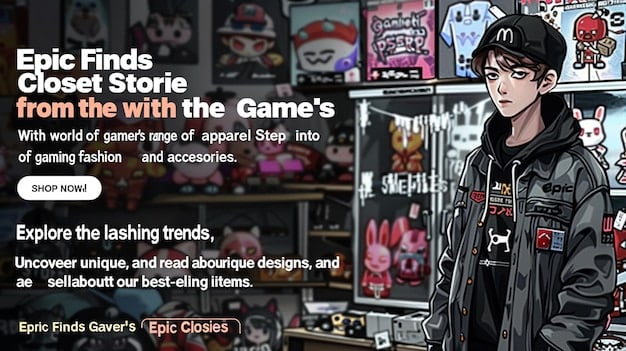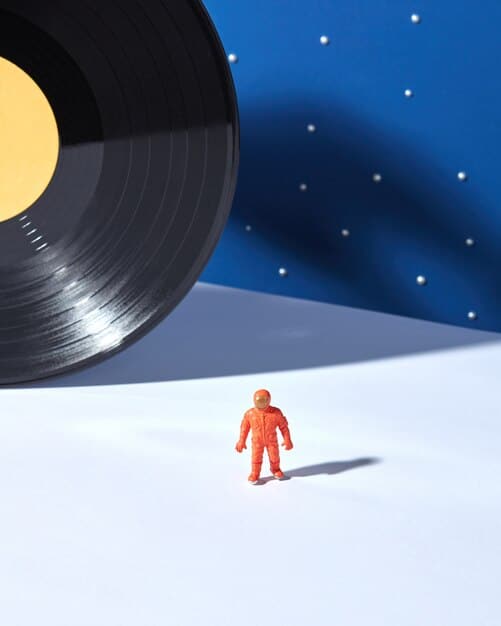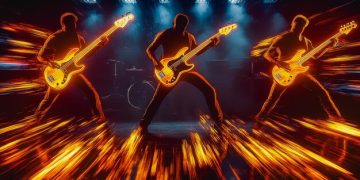Rock Band NFT Launch: Fans Divided Over Digital Collectibles

Rock Band’s NFT Collection Launch sparks mixed reactions from fans, with some embracing the digital collectibles while others express concerns over environmental impact and artistic integrity.
The world of rock music is constantly evolving, and now it’s colliding with the burgeoning realm of Non-Fungible Tokens (NFTs). Recently, a prominent Rock Band Launches NFT Collection – Fans React with Mixed Opinions, sparking a debate that encapsulates the broader discussion around art, technology, and value in the digital age.
Rock Meets Blockchain: Band’s NFT Debut
The band’s decision to venture into the NFT space marks a significant moment in the music industry. But what motivated this move, and what exactly does this NFT collection entail? This section delves into the specifics of the launch, exploring the types of NFTs offered, the platform used, and the band’s rationale behind this digital endeavor.
The Allure of NFTs for Musicians
For musicians, NFTs offer a new avenue for revenue generation and direct engagement with fans. Unlike traditional streaming models, NFTs allow artists to sell unique digital assets directly to collectors, cutting out intermediaries and potentially generating higher profits.
What’s Included in the Collection?
The NFT collection typically includes a variety of digital assets, such as exclusive artwork, unreleased music tracks, behind-the-scenes footage, and virtual merchandise. Some NFTs also offer real-world perks, like access to concerts or meet-and-greets.
- Exclusive Digital Artwork: Limited-edition artwork designed specifically for the NFT collection.
- Unreleased Music: Rare tracks or demos that are not available on streaming platforms.
- Virtual Merchandise: Digital versions of band merchandise, such as avatars or virtual instruments.
- Real-World Perks: Opportunities to attend concerts, meet the band, or receive signed memorabilia.
The move to launch an NFT collection reflects a growing trend among musicians seeking new ways to connect with their fanbase and monetize their art in the digital age.

Fan Reaction: A Symphony of Support and Skepticism
The response to the Rock Band Launches NFT Collection – Fans React with Mixed Opinions. While some fans eagerly embraced the opportunity to own unique digital collectibles, others expressed concerns about the environmental impact of NFTs, the perceived “cash grab” nature of the project, and the potential for fraud and speculation.
The Enthusiasts: Embracing the Digital Frontier
Many fans see NFTs as a way to support their favorite artists directly and own a piece of music history. They appreciate the exclusivity and the potential for these digital assets to increase in value over time.
The Skeptics: Concerns and Criticisms
On the other hand, some fans voiced concerns about the environmental impact of NFTs, which can consume significant amounts of energy due to the blockchain technology they rely on.
- Environmental Concerns: The energy consumption associated with blockchain technology.
- Perceived “Cash Grab”: Concerns that the band is simply trying to profit from a trendy technology.
- Fraud and Speculation: The potential for scams and artificially inflated prices in the NFT market.
The divided reaction underscores the ongoing debate surrounding NFTs and their role in the future of art and music.
Environmental Impact: Addressing the Concerns
One of the most prominent criticisms of NFTs is their environmental impact. The blockchain technology that underpins many NFTs requires significant amounts of energy to operate, leading to concerns about carbon emissions and sustainability. This section explores the environmental implications of the band’s NFT collection and potential mitigation strategies.
Understanding the Energy Consumption
The energy consumption of NFTs is primarily linked to the “proof-of-work” consensus mechanism used by some blockchain networks. This mechanism requires computers to solve complex mathematical problems in order to validate transactions, consuming large amounts of electricity.
Mitigation Strategies and Sustainable Alternatives
Fortunately, there are several ways to mitigate the environmental impact of NFTs. One option is to use more energy-efficient blockchain networks that utilize alternative consensus mechanisms, such as “proof-of-stake,” which require significantly less energy.
Addressing environmental concerns is crucial for the long-term sustainability of the NFT market and its acceptance by the wider public.
Artistic Integrity: Authenticity in the Digital Age
Beyond environmental concerns, some critics question the artistic integrity of NFTs. They argue that the focus on scarcity and speculation detracts from the intrinsic value of art and music. This section examines the debate surrounding artistic integrity in the context of NFTs and explores how artists can maintain authenticity in the digital age.

The Commodification of Art?
Some argue that NFTs turn art into a commodity, prioritizing financial value over artistic merit. They fear that this commodification will lead to a decline in creativity and innovation.
Maintaining Authenticity and Artistic Vision
Despite these concerns, many artists see NFTs as a way to express their creativity and connect with fans on a deeper level. By carefully curating their NFT collections and focusing on artistic value, artists can maintain their authenticity and artistic vision.
- Focus on Artistic Value: Prioritize creativity and quality over financial gain.
- Engage with Fans: Use NFTs to build stronger relationships with fans and create a sense of community.
- Be Transparent: Communicate clearly with fans about the purpose and value of the NFT collection.
By prioritizing artistic integrity and engaging with fans in a meaningful way, artists can use NFTs to enhance their creative practice and build a more sustainable career.
The Future of Music and NFTs: A Harmonious Blend?
The intersection of music and NFTs is still in its early stages, but it holds immense potential for both artists and fans. As the technology evolves and the market matures, NFTs could revolutionize the way music is created, distributed, and consumed. This section explores the potential future of music and NFTs, examining the opportunities and challenges that lie ahead.
New Revenue Streams and Fan Engagement
NFTs offer musicians new revenue streams beyond traditional streaming models. By selling unique digital assets directly to fans, artists can generate higher profits and build stronger relationships with their audience.
Challenges and Opportunities
Despite the potential benefits, there are also challenges to overcome. The environmental impact of NFTs, the potential for fraud and speculation, and the need to maintain artistic integrity are all important considerations.
The future of music and NFTs will depend on how artists, fans, and developers address these challenges and harness the potential of this technology to create a more vibrant and sustainable music ecosystem.
Case Studies: Other Bands Embracing NFTs
The Rock Band Launches NFT Collection – Fans React with Mixed Opinions, but they certainly aren’t alone. Several other bands and musicians have already ventured into the NFT space, experimenting with different approaches and achieving varying degrees of success. This section examines some notable case studies, highlighting the successes and failures of other artists in the world of music NFTs.
Kings of Leon: Pioneer NFT Adoption
Kings of Leon was one of the first major bands to release an NFT collection, offering fans the chance to purchase digital art and unlock exclusive experiences. Their success showed artists the potential of NFTs.
Grimes: Innovative Digital Art Sales
Grimes, the musician and producer, has had great success selling digital art with NFTs. Her approach highlights the ways that artists can capitalize on digital scarcity.
- Kings of Leon set precedents for major band NFT initiatives.
- Grimes demonstrated a market for purely digital art.
- Experimentation and clear communication with fans appear vital in successful NFT campaigns.
Analyzing these case studies enables the rock community to glean best practices for the innovative digital landscape to leverage NFTs effectively.
| Key Point | Brief Description |
|---|---|
| 🎵 NFT Debut | Rock Band’s entry into NFTs sparks debate. |
| 🌍 Eco-Concerns | Environmental criticism surrounds blockchain. |
| 🎨 Art Integrity | Questions raised about art’s value amidst NFT hype. |
| 🚀 Future Music | NFTs’ role in music’s evolution is unfolding. |
FAQ Section
▼
NFTs or Non-Fungible Tokens are unique, irreplaceable digital assets recorded on a blockchain, used to represent ownership of digital items, often related to art, music, or collectibles.
▼
Artists use NFTs to gain new revenue streams, control distribution directly, engage niche fan bases, and ensure digital scarcity, driving value and authenticity.
▼
NFTs raise environmental worries due to the energy-intensive “proof of work” consensus mechanisms used by some blockchains, contributing to significant carbon footprints.
▼
Artists ensure authenticity by minting their NFTs through verified platforms, using watermarks and metadata, and engaging transparently with their community about the origins.
▼
The future melds innovation and engagement, providing opportunities for niche music ownership, unique fan experiences, and sustainable blockchain solutions address environmental impact concerns proactively.
Conclusion
As the landscape continues to evolve, engaging in the dialogue surrounding the Rock Band Launches NFT Collection – Fans React with Mixed Opinions, it is important to note that the fusion of rock music and NFTs represents just a single step into the quickly-changing realm of possibilities where art, technology, and fan experiences converge. Evaluating the consequences along with embracing a sustainable and innovative approach will shape the trajectory of how rock bands, as well as more music artists, co-exist within the digital ecosystem.





